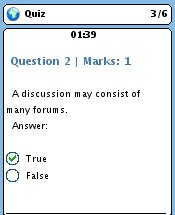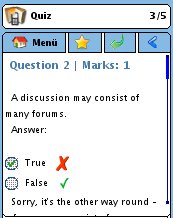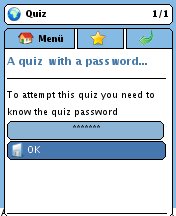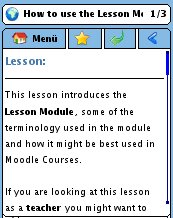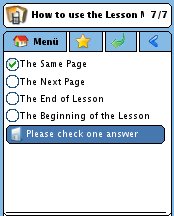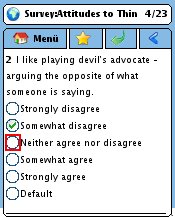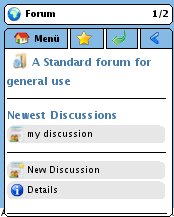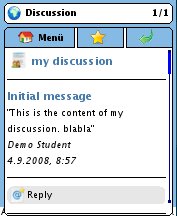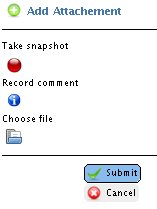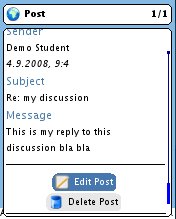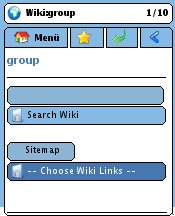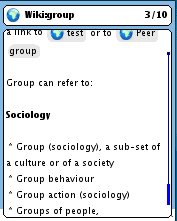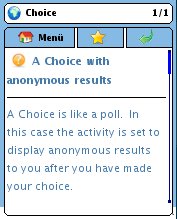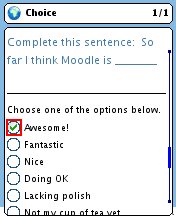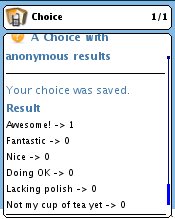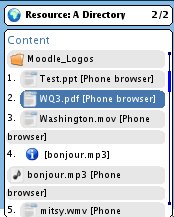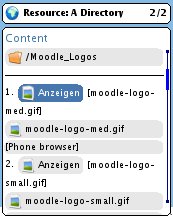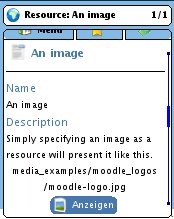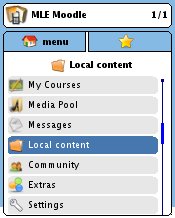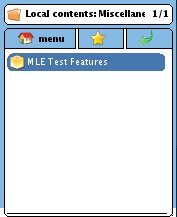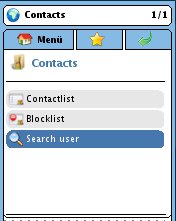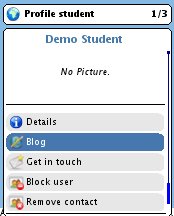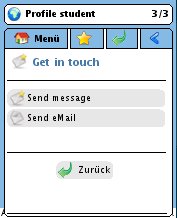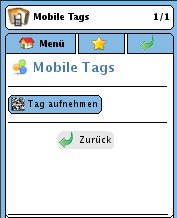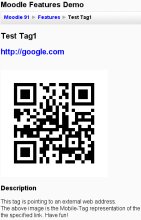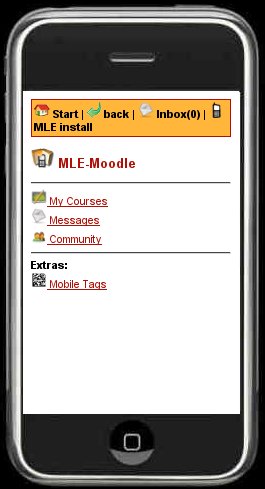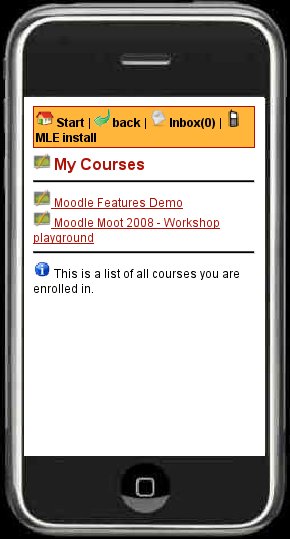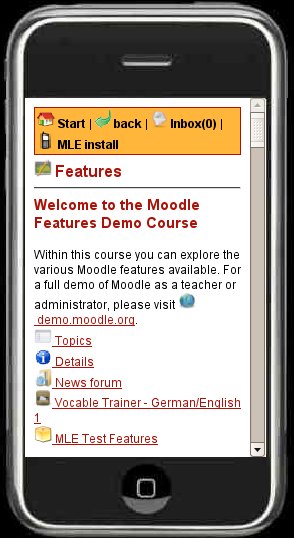Moodle Quizzes:
A quiz tests, consists out of multiple choice, true-false, and short answer questions and more.
Each attempt is automatically marked, and the teacher can choose whether to give feedback or
to show correct answers. You can use the quizzes with all functionallity on the
MLE too, even a quiz with a timeout works on the MLE.
| 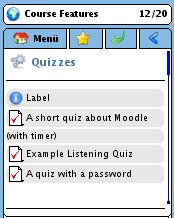 |
Moodle Lessons:
A lesson consists out of multiple choices and each page ends with a question.
The navigation through the lesson can be simple or complex and of course the
Moodle Lessons work fully on the MLE. Create one learning content and use it
for eLearning and mLearning.
| 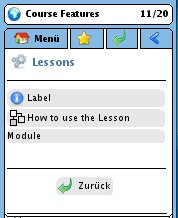 |
Moodle Assignments:
You and submit an assignment or view the correction via the mobile phone.
These assignment types are avaliable:
- Online / Offline assignments
- Single file upload assignments
| 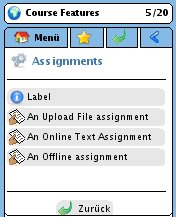 |
Moodle Surveys:
The Survey module provides a number of verified survey instruments that
have been found useful in assessing and stimulating learning in online
environments. It is fully functionaly on the MLE.
| 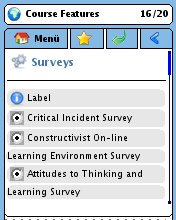 |
Moodle Forums:
The Moodle forums are of course accessible through the mobile client. You can read
and create / edit discussions and replies. Furthermore you are able to attach
selfmade pictures, videos or audio recordings to your discussions and forum posts
which you can instantly record with your phone or you can choose from the file system.
| 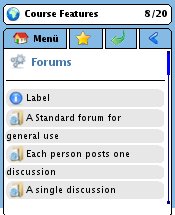 |
Moodle Wikis:
You can view the Moodle Wikis on the MLE too.
| 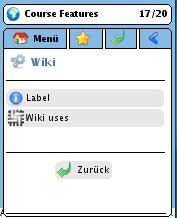 |
Moodle choices:
Choices can be used with MLE. So it is possible to implement mobile
votes or collect feedback via the mobile phone too.
| 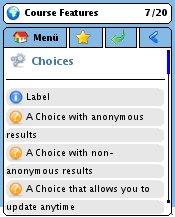 |
Moodle Ressources:
Of course you can access a variety of Moodle ressources with the MLE too,
for example:
- Texts
- HTML Texts
- Images
- Video
- Audio
- Links
- Directories
| 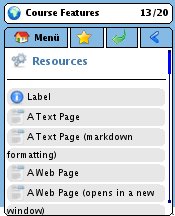 |

| Flashcard Trainer: |
The flashcard trainer is a totaly new feature for Moodle. It can be used with
the MLE (mobile phone) and with the web-browser. A synchronization feature allows
you to continue learning on both sides.
What is a flashcard trainer?
A flashcard or flash card is a card that is used as a learning aid.
One writes a question on a card and an answer overleaf.
Flashcards can bear vocabulary, historical dates, formulas or any subject matter that can be learned via a question and answer format.
Flashcards are widely used as a learning drill to aid memorization by way of spaced repetition.
A widely used method to efficiently use flashcards was proposed by the German science popularizer Sebastian Leitner in the 1970s is used in this flashcard-trainer. In his method, known as the Leitner system, flashcards are sorted into groups according to how well you know each one. This is how it works: you try to recall the solution written on a flashcard. If you succeed, you send the card to the next group. But if you fail, you send it back to the first group. Each succeeding group has a longer period of time before you are required to revisit the cards.
For example, suppose you have 3 groups called Group 1, Group 2 and Group 3. The cards in Group 1 are the ones that you often make mistakes with, and Group 3 contains the cards that you know very well. You might choose to study the Group 1 cards once a day, Group 2 every 3 days, and the Group 3 cards every 5 days. If you look at a Group 1 card and get the correct answer, you "promote" it to Group 2. A correct answer with a Group 2 card "promotes" that card to Group 3. If you make a mistake with a Group 2 or Group 3 card, it gets "demoted" to Group 1, which forces you to study that card more often.
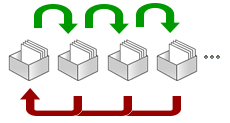
The advantage of this method is that you can focus on the most difficult flashcards, which remain in the first few groups. The result is, ideally, a reduction in the amount of study time needed.
| 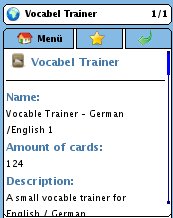
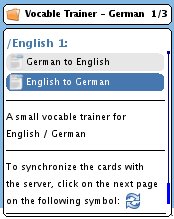
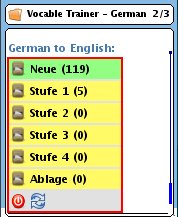
|

| Mobile Learning Objects (MLOs): |
A Mobile Learning Object is a learning object especially for the MLE. It
can be stored on the mobile phone and afterwards used without any internet
connection (offline learning). The MLOs implement all the great learning features
of the MLE, including:
- Interactive questions with instant automatic correction
- Fill-In questions
- Multiple and Single Choice Questions
- Order / Sorting questions
- Grafical markup questions
- FlashCard Trainer / Vocabulary trainer
- and lots more (check out the MLE features page for more)
MLOs can be easily created with a built-in grafical editor (the MLE-Editor,
a What-You-See-Is-Waht-You-Get Editor to create content). So everyone can
create a mobile learning content, you don't need to be a programmer to do this.
You can even use the MLE-Editor to create mobile eBooks, which are optimized for
a hugh amount of pages.
You can view MLOs now (with the basic most common features) with your web-browser too,
therefore you can use this content for both sides (mobile phone and PC).
| 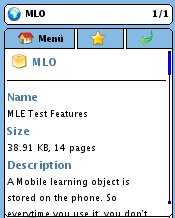 |

| Communications and Messaging: |
MLE Moodle fully integrates into the Moodle messaging system. You are even
notificated on the mobile phone, if a new message has been sent to you, no matter
if the message has been created via a mobile phone or via the Web-Browser.
So there is no need for SMS notification anymore!
The Moodle block "Online Users (mobile)" shows the Web users, who is online and
who is currently online with a mobile phone.
Furthermore you have full access to the contact and blocklist on the MLE and you
can initiate phone calls, if the user has provided his phone number.
| 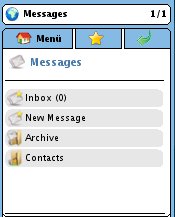 |

| Mobile Tags: |
With mobile tagging you can easily implement context based or location based
learning scenarios.
You can easily create tags which can be interpreted by the MLE (if your phone
meets the requirements) or by any QR-Barcode Reader. Decoding a tag is as simple
as taking a picture with your mobile phone.
The integration of both creation and decoding capabilities of tags allows you to
easily use this powerful feature in a great variatey of mobile learning scenarios,
without the need of any external or third-party tools.
The Mobile Tagging module allows different types of tags to be created.
You can either create a tag linking to an URL, or Moodle specific tags directly
forwarding the mobile user to a given course or activity.
It is even possible to assign geo-information (coordinates) to a tag.
This can be used to emulate GPS capabilities when real positioning is not
available:
- Link Tag
- Course Link Tag
- Activity Tag
- Location Tag
| 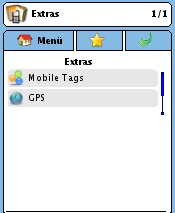 |

| Mobile Community: |
The Mobile Community is a special course, that is made available to all mobile Moodle users (
useually a user is enrolled to a specific course to get access too).
This is course is intended to be used for any community activities as well as special mobile contents
like menu plans, timetables or library opening hours you want to easily
make available to all your mobile users.
| 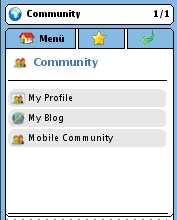 |

| Easy mobile client download: |
The download of the mobile client is very easy. Just add the "MLE-Download" block
and everyone can download the preconfigured client for your moodle installation by
clicking on the Download-Button and follow the installation-instructions.
The normal installation procedure would be: Click on the download-button -
choose your mobile phone - enter your phone number to receive an installation
SMS - on your mobile phone open the SMS and click on the link - the installation
starts and you will find the MLE in your mobile phone menu. That's it!
The installation of the MLE Moodle plugin is very simply too. Just copy the content
to your moodle installation and activate the MLE plugin. That's it!
|

| MLE-Moodle with the mobile phone browser: |
It is now possible to access your Moodle Server with the normal mobile phone browser too (of course in an optimized way for mobile phones).
In some use-cases it might be not necessary to install a new application on your phone just to access Moodle, if you just want to go through a quiz it might be easier to just open the adress in the browser already installed on your mobile phone. (Be aware that offline learning won't work if you access MLE-Moodle with the phone browser!).
| |

